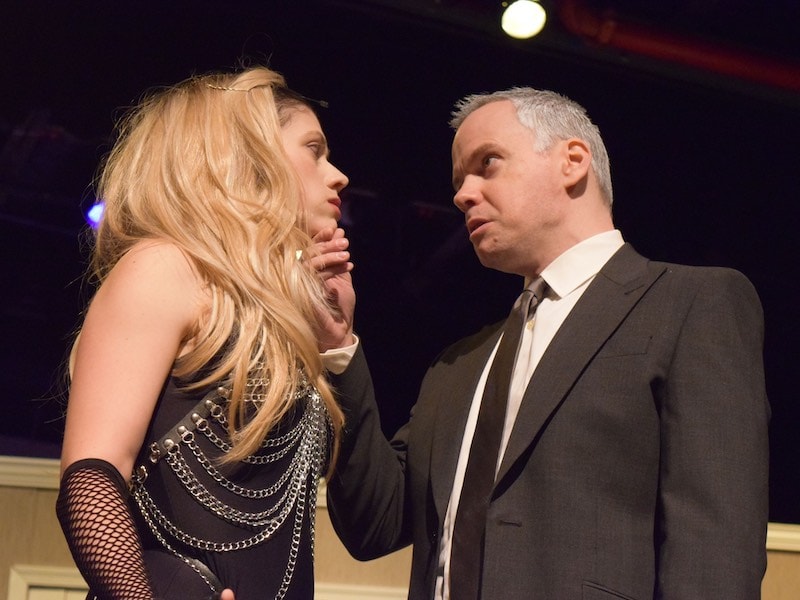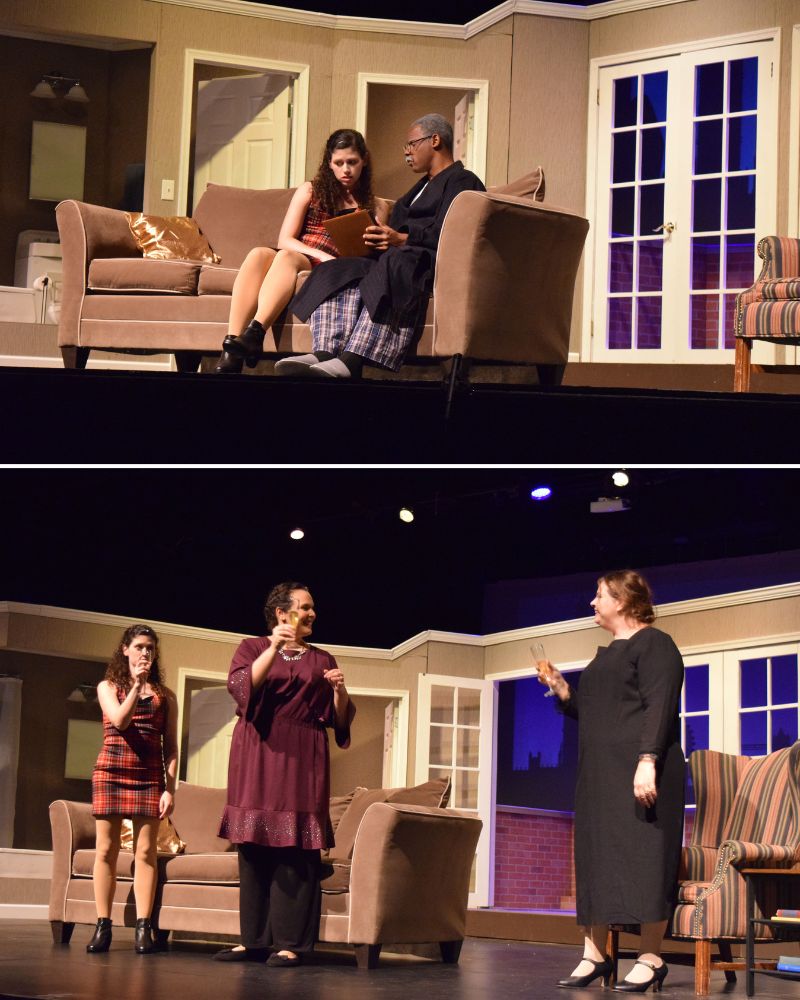If, on your next visit to the UK, you feel a yen for time travel, search out Doctor Who’s phone booth. Do not rely on a mysterious closet door in your hotel room. It’s not up to the task. Neither, unfortunately, is prolific British playwright Alan Ayckbourn’s Communicating Doors, now playing at Rockville Little Theatre.
Ayckbourn’s one-trick pony of a script is simply not very good. The trick is that the closet door in question leads to an oddly limited time warp: it does only 20-year jumps, in one temporal direction, for most but not all characters.

We first see a “special sexual consultant” arrive in 2023 at a large, generically bland, London hotel suite. Phoebe (Gemma Davimes), whose trade name is Poopay, and whose dominatrix outfit is the highlight of Jennifer Morrissey and Becky Bucci’s costume design, finds that her client, Reece (Donta Hensley), does not seek her usual services. A dying old man with a guilty conscience, he asks Phoebe to sign as a witness on his written confession of long-term financial chicanery and complicity in the long-ago murders of two different wives. (Why a dominatrix when a notary would do? A few tame sex jokes aside, Phoebe’s part in the plot could as easily be filled by a woman in any line of work.)
Their initial scene illustrates a chronic problem in the production. The actors’ British accents are so thick, and, especially in Phoebe’s case, sometimes delivered so quickly, that many of the lines are unintelligible.
There are two main exceptions to this problem. Julian (David Dieudonné) speaks his evil clearly and, except for a couple Snidely Whiplash chortles, in a well-controlled fashion. He is as credible as one can expect for a stock villain. As Ruella, Reece’s second wife, Erica Irving delivers a crisp performance — the production’s best — as a no-nonsense, take-charge character.
When Phoebe, on the run from Julian, pops through the time warp for the first time, she meets Ruella, in the same hotel room in 2003, warning her of her then-impending murder. Realizing that Reece’s first wife, Jessica (Kat Binney), had been killed in 1990, Ruella uses the closet door to go back to 1983 to alert Jessica to the danger. The three women, good-hearted and brave all, then work through the ensuing complications in their intersecting timelines to thwart Julian’s homicidal plans, at times manipulating Harold — the hotel’s veteran, dim-witted security officer (David Gannon) — to abet their schemes.
Director Tristan Poje and fight/intimacy coordinator Ian Claar have some issues with the characters’ physicality. Phoebe is all arms wildly akimbo. In Reece’s first scene, his age and infirmity are portrayed as exaggeratedly doddering. Physical comedy scenes, like a struggle between Harold and Ruella and the climactic attempt by Phoebe and Jessica to save Ruella from a fatal fall, look awkward.

John Decker’s set design has all the doors one could want for a farce, though the script does not call for using them in the quick, precisely timed way that a farce would. The key part of the set is a chamber placed behind the closet door, which rotates whenever time warps, accompanied by flashing lights and a rasping electronic sound, all appropriately spooky. Lighting designer Steve Deming also created projections that helpfully display the year (and in the second act, the suite number) in which a given scene occurs, avoiding potential confusion for the audience.
Even the most sterling production of Communicating Doors would have difficulty making the play work well. As Urinetown’s Officer Lockstock says, “Nothing can kill a show like too much exposition,” and the first act of Communicating Doors gives the audience a heavy dose. The “thriller” element of the play is weak tea — no chills down the spine — and the occasional comic lines drew only chuckles from the audience. We learn who the murderer is in the first scene. The play feels lengthy, including a prolonged coda following the climax of the plot as the characters sort out the implications of the changes their time travel adventures have made in their lives.
The theme that quite different women — treated as objects to be discarded by men in their lives — can band together to get some justice and improve their situations in life is a positive one. Ayckbourn deserves credit for making it a hallmark of his 1994 script, and the Rockville production underlines the point.
There’s also an innovative element concerning the time travel element of the play. In most time travel stories — like those in various Star Trek series — messing with a timeline is a really bad idea. Here, however, altering multiple timelines leads to far happier outcomes for everyone concerned (well, except Julian), as well as to a highly sentimental finish to the play. Nice, but insufficient to rescue Communicating Doors.
Running Time: Two hours and 25 minutes, including one intermission.
Communicating Doors plays through October 1, 2023, presented by Rockville Little Theatre performing at the F. Scott Fitzgerald Theatre, 603 Edmonston Dr, Rockville, MD. Friday and Saturday shows take place at 8 PM, and Sunday shows take place at 2 PM. Purchase tickets ($22; $20 for students and seniors) online.
The Communicating Doors cast and creative credits are here.
COVID Safety: Masks optional.




